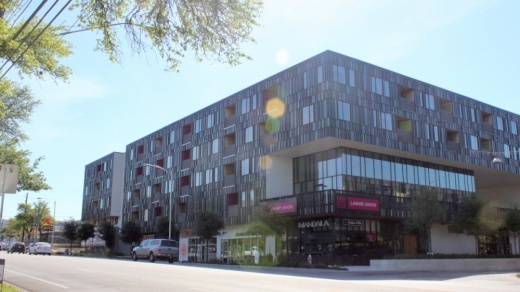A concept from District 5 Council Member Ann Kitchen centered on mixed-use developments will be up for consideration during council's Nov. 18 meeting. The change would expand Austin's vertical mixed-use, or VMU, zoning designation to allow projects with both housing and commercial space to built higher in exchange for affordable housing commitments.
Kitchen said she views the proposal as one that addresses both community and market demands for affordable housing and taller buildings on Austin's transit corridors.
“It’s pretty narrowly focused, and it’s certainly not something that will address all the concerns that the community has from the need for affordable housing, but it’s targeted," Kitchen told Community Impact Newspaper. "It’s targeted for one option that should be helpful."
If the update is approved, the existing VMU designation would see no change, other than being renamed VMU1. Additionally, under a new label of VMU2, buildings would be allowed an extra 30 feet of height—good for up to 90 feet in total—if a larger portion of residences are available for those earning a lower level of Austin's median family income, or MFI. As of 2021, the median family income for a family of four in Austin is $98,900.
"Right now, an applicant may go through a zoning process to request 90 feet in an area, but they don’t have an option to do that ... with affordable housing secured. We want to allow that option," Kitchen said.
Currently, ownership projects approved for VMU are required to include 5% of units below 80% MFI and an additional 5% below 100% MFI. For rental projects, 10% of all living spaces are required to be available at between 60% and 80% MFI.
Those limits would stay the same for buildings limited to the standard 60 feet in height under the new VMU1 designation, with any adjustments being made under the VMU2 label for taller buildings. If approved, Kitchen's resolution covering the zoning change would direct city management to come up with VMU2 requirements by next March.
Kitchen said the VMU program has proven to be "very successful" since Austin first adopted the label in 2006, with more than 100 buildings and 1,600 affordable units added. However, she said the draw of taller construction along major arteries has made a program update more pressing.
“This VMU option, these vertical mixed-use overlay districts, has been very successful. It is one of our affordable housing programs that’s produced results," Kitchen said. "I think what we’ve got here is a program that works, that it makes sense to add another option in response to what we’re seeing in the market.”
Taking stock of housing
Council is set to vote on Kitchen's code amendment ahead of a work session dedicated to the broader issue of housing affordability and availability in the city later this month.
According to council message board discussions about that meeting, set for Nov. 30, officials could bring a range of ideas related to housing to the table. Concepts floated so far include changes to accessory dwelling unit, or ADU, regulations; expanding residential zoning in commercial areas; securing more student housing citywide; and improvements to development permitting.
Council's last deep dive into land use almost led to an overhaul of the city's decades-old land development code, covering what types of buildings can go where in Austin. That often-contentious process nearly made it to the finish line in early 2020 before stalling out due to a citizen lawsuit and the COVID-19 pandemic. Austin is fighting a court ruling against its land code rewrite of 2019-20, and oral arguments in the city's appeal are set for Nov. 17.
Regardless of the outcome, Kitchen said council's revived housing talks will likely stick to more targeted measures such as her VMU item or an upcoming ADU resolution from District 9 Council Member Kathie Tovo, rather than another exhaustive code update.
"Although we need to have a comprehensive conversation, we should also just move forward with simple solutions like the one that I’m proposing," Kitchen said. “Regardless of how [the lawsuit] turns out, I think it makes more sense to just continue tackling different issues and making progress on them."





